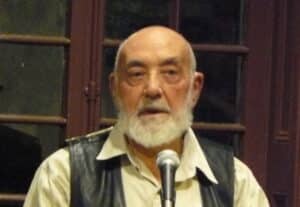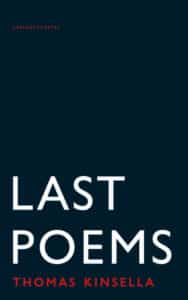Thomas Kinsella explored the eternal questions in his poetry
I would like to say I read this somewhere, but I didn’t. The kinds of things and questions you’re interested in change as you age. When you’re a young adult, life is about, well, life — dating, marriage, family, and career, not necessarily in that order. When you’re older, you discover the pleasures of an art museum, and learning what Claude Monet was trying to say with Water Lilies and what that Hellenistic statue called Running Artemis looked like with a head and limbs; tracing the family genealogy to discover whether your great- or great-great-grandfather really fought in the Civil War; and discovering the joy you have with grandchildren that you never had with your own children (all the pressure is off).
It’s a natural thing, I suppose. The concerns of youth aren’t the concerns of old age.

Thomas Kinsella
I was reminded of this when I read Last Poems by the Irish poet Thomas Kinsella (1928-2021). The collection was published this year; it comprises the poems of five chapbooks published between 2006 and 2011, along with a selection of new (unpublished) poems, poem fragments, and revised poems Kinsella wrote before his death in 2021.
Kinsella was and remains something of the quintessential Irish poet. In his poetry and nonfiction, he wrote about place — Ireland, Dublin — and politics. His friends included Irish poets, writers, and composers. For a time, he was part of the Irish diaspora, teaching at Southern Illinois University-Carbondale and Temple University; he established Temple’s Irish Studies program. He published more than 30 poetry collections, and he established Peppercanister Press to publish his work.
Critics tend to like his early and late poems, seeing his “middle period” as more superficial (one critic thought it “deliberately superficial”). While Kinsella considered the large questions of life throughout his writing career, the subject becomes more pronounced as he grew older. Reading Last Poems is an exploration of and a reflection on those questions of life and death, meaning, faith and unbelief, creating a sense of order in what looks like an increasingly disordered world, the self-understanding of old age, and looking back at what shapes a life.
This poem fragment (indicated by the comma after the last word) suggests some of those questions. The poet is standing on the top, perhaps final, landing of life, when he sees a baby pass by. The baby is himself; it bears an old man’s face. Without saying it, you know what he’s experiencing — how quickly his life has happened.
Night Elder

as I often do when retiring,
looking out at the night;
—when there appeared in mid air before me
a bare baby, male, passing,
little head first.
It turned toward me, as it passed,
an old man’s face. And was gone,
I continued to my room,
loneliness in my loins,
The poet continues on to his room, and we know what room this is — the final room to which we all must travel by ourselves. This poem isn’t a taking stock of one’s life; it is more the marveling at how fast one’s life passes, and it raises the question, what does all this mean? What does my life mean? And is that really the question I should be asking?
In addition to his poetry, Kinsella also published three prose collections and early Irish texts. He received an honorary doctorate from University College Dublin and the honorary Freedom of the City of Dublin, one of only 82 people who’ve received that recognition.
Last Poems likely contains more meaning to those of us “of a certain age.” But it’s comforting, in a way, to know Kinsella wrestled with many of the same questions we all wrestle with. The questions may be universal, but the answers are anything but.
Photo by Pacheco, Creative Commons, via Flickr. Post by Glynn Young.
How to Read a Poem uses images like the mouse, the hive, the switch (from the Billy Collins poem)—to guide readers into new ways of understanding poems. Anthology included.
“I require all our incoming poetry students—in the MFA I direct—to buy and read this book.”
—Jeanetta Calhoun Mish
- Poets and Poems: Sandra Marchetti and “Diorama” - April 24, 2025
- Poets and Poems: Christina Cook and “Roaming the Labyrinth” - April 22, 2025
- Longfellow’s “Paul Revere’s Ride”: Creating a National Legend - April 17, 2025


David Kellogg says
This is a useful review. I love this book, but then, I love Kinsella’s poetry in general. Can I ask who called his middle period “deliberately superficial”? I can believe someone said that, though I can’t decide who.
Glynn says
David, see the Poetry Foundation’s listing for Kinsella, second paragraph from the end. https://www.poetryfoundation.org/poets/thomas-kinsella